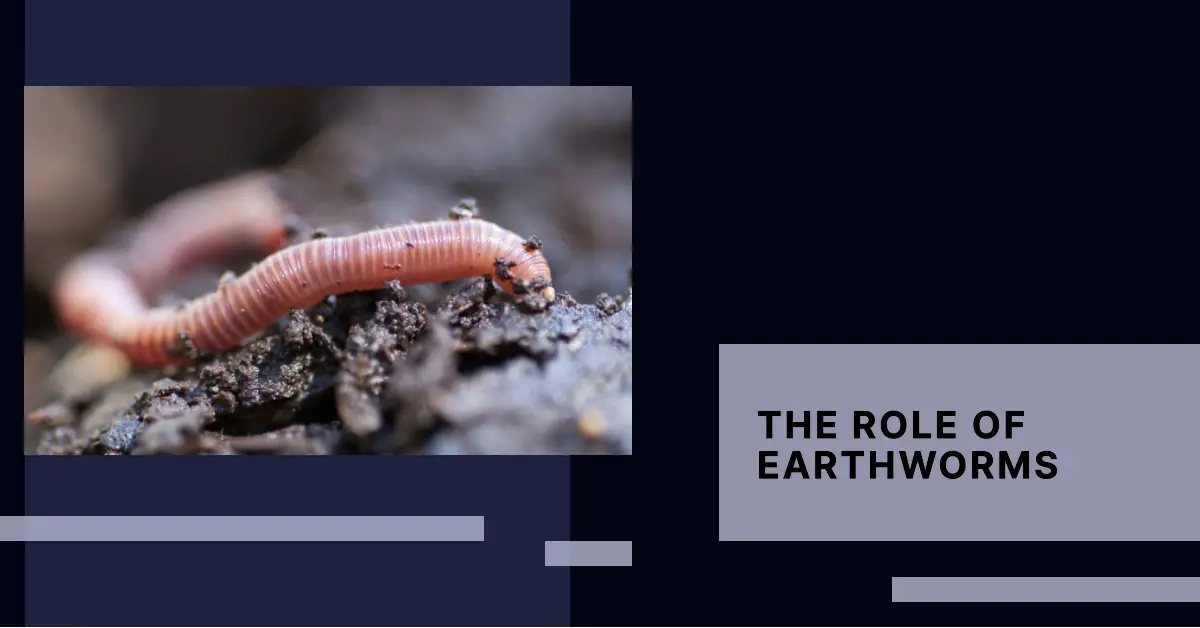
Jeffery Jago is a expert in horticulture and worm breeding. With a background in plant cultivation
Last Updated on March 26, 2023 by Jeffery Jago
Healthy plant growth relies heavily on soil fertility, and one of the most critical contributors to fertile soil is the humble earthworm.
Earthworms play a vital role in maintaining and improving soil structure, nutrient cycling, and overall soil health. This article will explore the various importance of earthworms in soil fertility and plant growth, making them essential partners in creating thriving gardens and ecosystems.

Earthworms and Soil Structure
Earthworms are often called nature’s engineers because they create complex networks of burrows and tunnels as they move through the soil. These tunnels serve several essential purposes:
- Soil aeration: Earthworm tunnels allow air to circulate through the soil, providing the necessary oxygen for plant roots and beneficial soil microbes.
- Water infiltration and drainage: The channels created by earthworms improve water infiltration, ensuring that plant roots have access to the moisture they need. These tunnels also help prevent waterlogged soil by allowing excess water to drain away.
- Soil structure improvement: Earthworms help to improve soil structure by breaking up compacted soil and creating a more porous soil environment. This allows for better root growth and improves soil water-holding capacity.
Nutrient Cycling and Availability
In addition to improving soil structure, earthworms play a crucial role in nutrient cycling and availability for plants.
As earthworms consume organic matter in the soil, they break it down into smaller particles, making nutrients more accessible for plants.
The result is nutrient-rich worm castings, which are a natural and highly effective fertilizer for plant growth.
Furthermore, earthworms also help to release nutrients that are bound up in soil particles, such as phosphorus and potassium.
They do this by breaking down mineral complexes and converting them into forms that plants can use.
This process, known as mineralization, helps to increase the availability of nutrients for plant uptake and growth. In this way, earthworms play a critical role in maintaining healthy soil fertility and promoting robust plant growth.
Enhancing Soil Microbial Activity
Earthworms not only contribute to nutrient availability directly, but they also have a significant impact on the soil’s microbial community.
These beneficial soil microbes, including bacteria and fungi, help decompose organic matter and release essential nutrients for plant uptake.
Earthworms facilitate the growth and activity of these microbes by providing a favorable environment within their burrows and by excreting nutrient-rich castings.
This enhanced microbial activity can improve plant growth and even help plants resist diseases.
Additionally, earthworms themselves host a range of beneficial microorganisms within their gut, which are deposited in the soil through their castings.
These microorganisms can help suppress harmful pathogens and promote plant growth. The excrement produced by earthworms also contains enzymes that can help break down toxins in the soil, further improving soil health and fertility.
Earthworms and Plant Root Development
The presence of earthworms in the soil has a direct influence on plant root development. The tunnels and burrows created by earthworms make it easier for plant roots to penetrate the soil and access the water and nutrients they need.
The improved soil structure resulting from earthworm activity promotes the development of healthy and robust root systems, which are crucial for overall plant health and resilience.
Earthworms also release growth-promoting hormones and enzymes that can stimulate root growth and enhance plant development.
As a result, the presence of earthworms in the soil can improve plant growth and yield, making them an important factor to consider for gardeners and farmers.
Attracting Earthworms to Your Garden
To encourage earthworm populations in your garden and reap the benefits of their activities, consider the following tips:
- Add organic matter and compost: Incorporate compost, aged manure, or other organic materials into your soil to provide earthworms with the food they need to thrive.
- Maintain proper soil pH, moisture, and aeration: Earthworms prefer a slightly acidic to neutral soil pH (approximately 6.0-7.0), adequate moisture, and well-aerated soil. Regularly check your soil’s pH and moisture levels, and make any necessary adjustments.
- Avoid harmful chemicals and practices: Refrain from using synthetic fertilizers, pesticides, and herbicides that can harm earthworm populations. Also, minimize soil disturbance, such as excessive tilling, which can destroy earthworm habitats and burrows.
- Provide a favorable habitat: Earthworms prefer soil with plenty of organic matter, good drainage, and a loose texture. Avoid compacted soil, which can make it difficult for earthworms to move through the soil.
- Mulch: Applying mulch to the soil surface can help retain moisture and provide a food source for earthworms.
- Provide cover crops: Cover crops, such as clover, can provide a food source for earthworms and help prevent soil erosion.
- Create a compost bin: A compost bin can provide a continuous source of organic matter and a favorable environment for earthworms to thrive.
Another way to increase earthworm populations in your garden is to breed them yourself or purchase them and spread them in your garden.
Here are some tips:
- Breed your own earthworms: You can create a worm bin using compost or other organic materials to breed your own earthworms. This allows you to have a sustainable source of earthworms to add to your garden as needed.
- Purchase earthworms: You can also purchase earthworms from local nurseries, garden centers, or online suppliers. Be sure to choose a reputable source and select earthworms that are suitable for your climate and soil conditions.
- Spread earthworms in your garden: Once you have acquired earthworms, you can spread them in your garden by simply scattering them throughout the soil. To increase the success of the introduction, it is best to spread earthworms during the spring or fall when the soil is moist and the temperatures are mild.
Conclusion
Earthworms play an essential role in soil fertility and plant growth, making them invaluable allies for gardeners and farmers alike.
By understanding the impact of earthworms on soil structure, nutrient availability, and microbial activity, we can appreciate their contributions to thriving gardens and ecosystems.
By adopting earthworm-friendly gardening practices, you can support these vital creatures and promote a healthy, productive garden.


